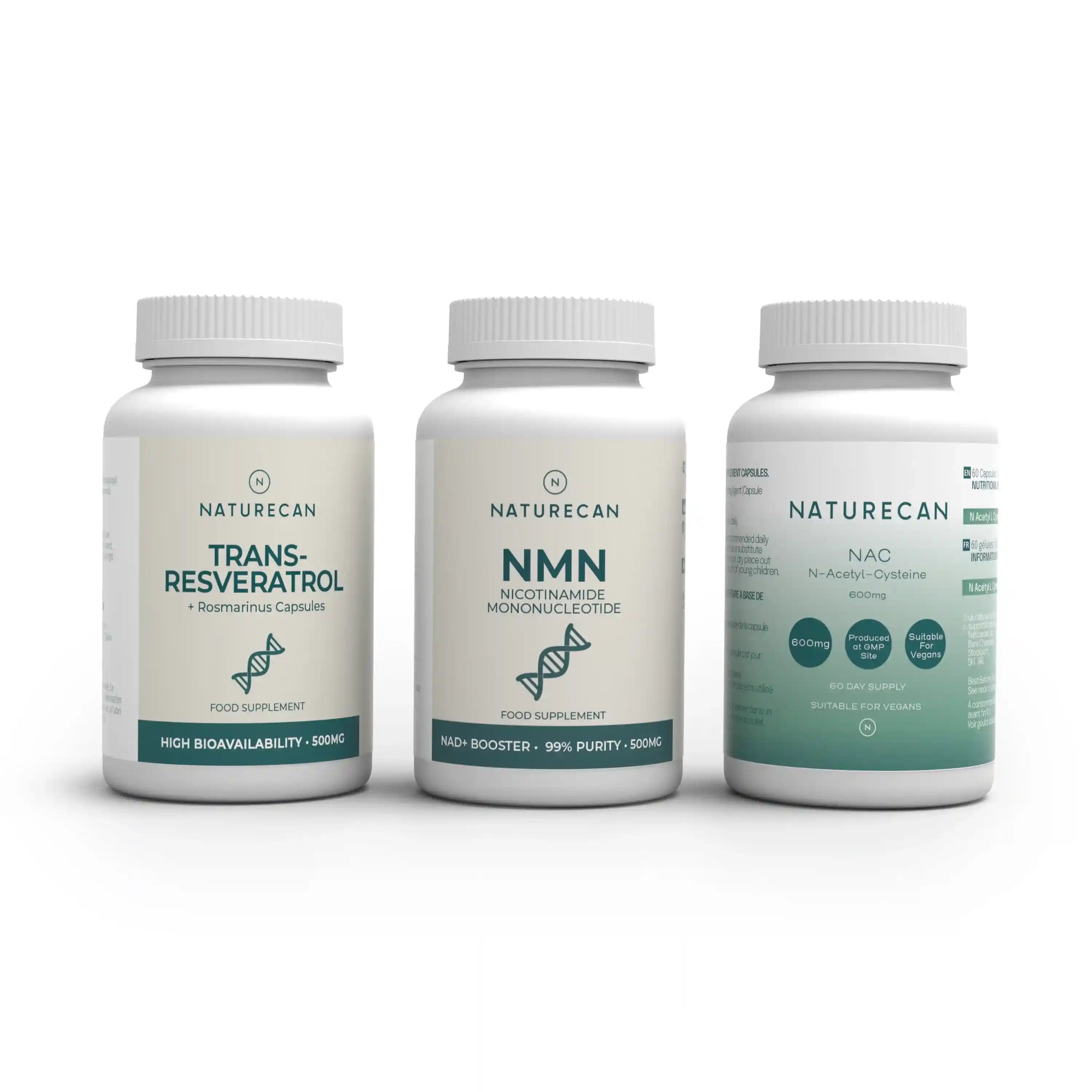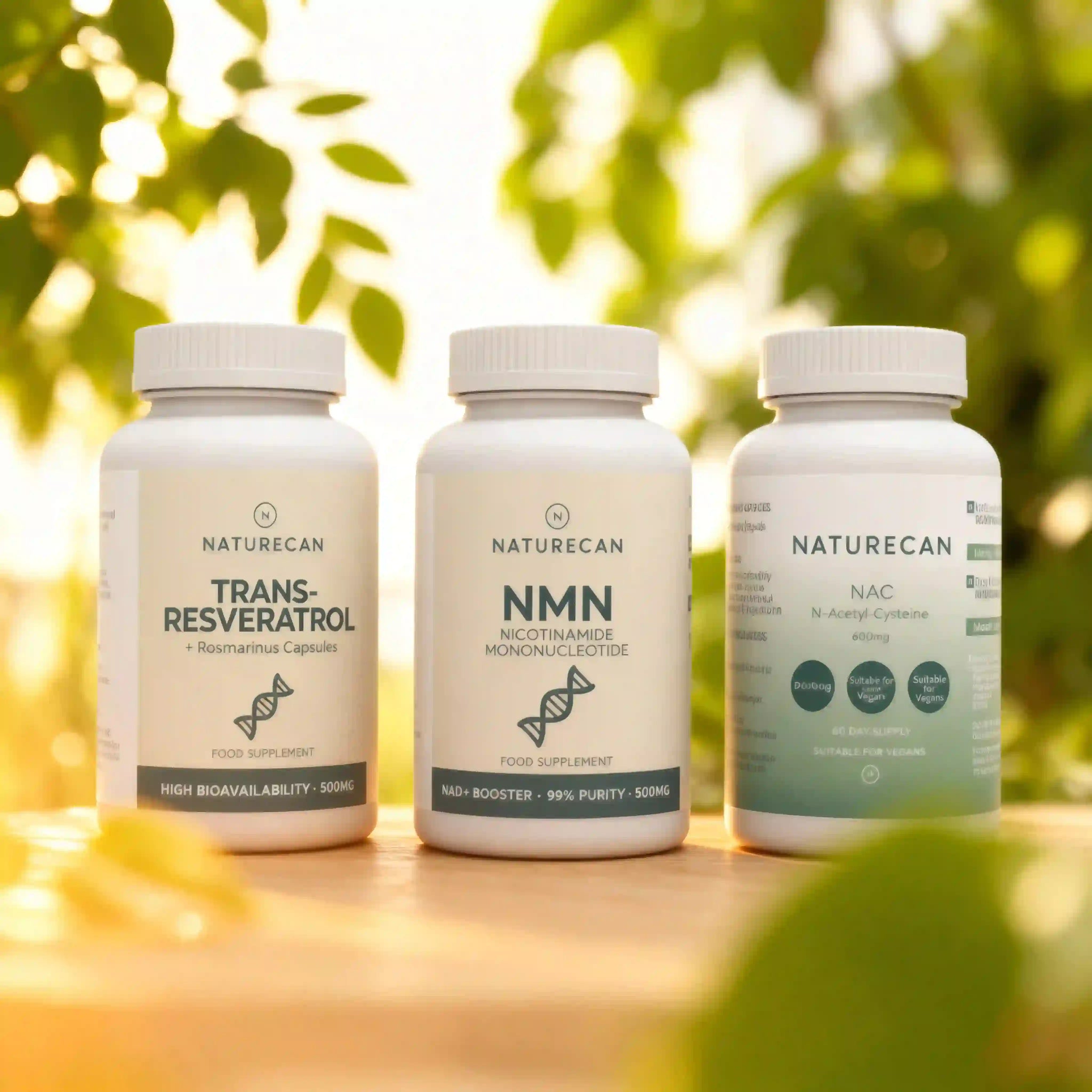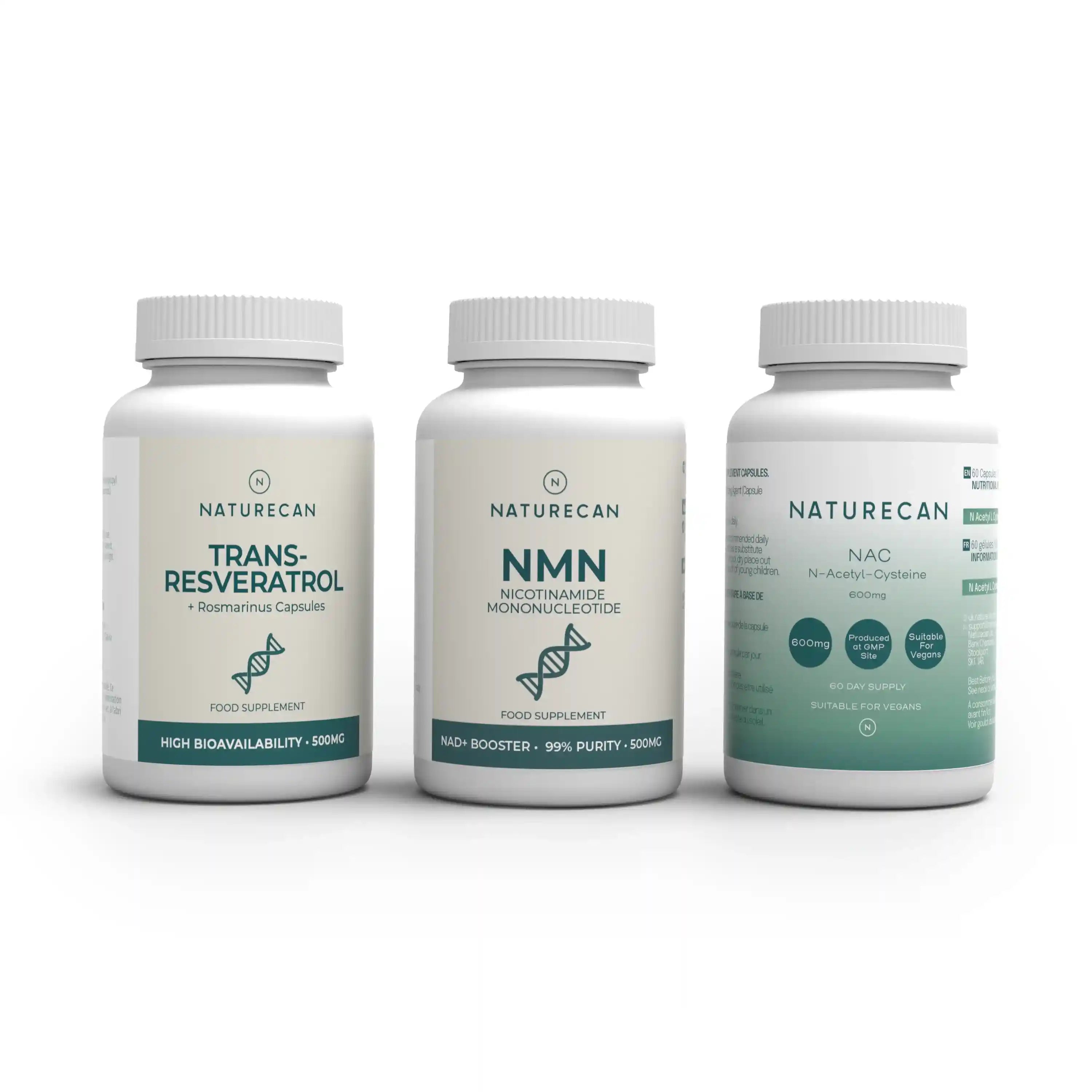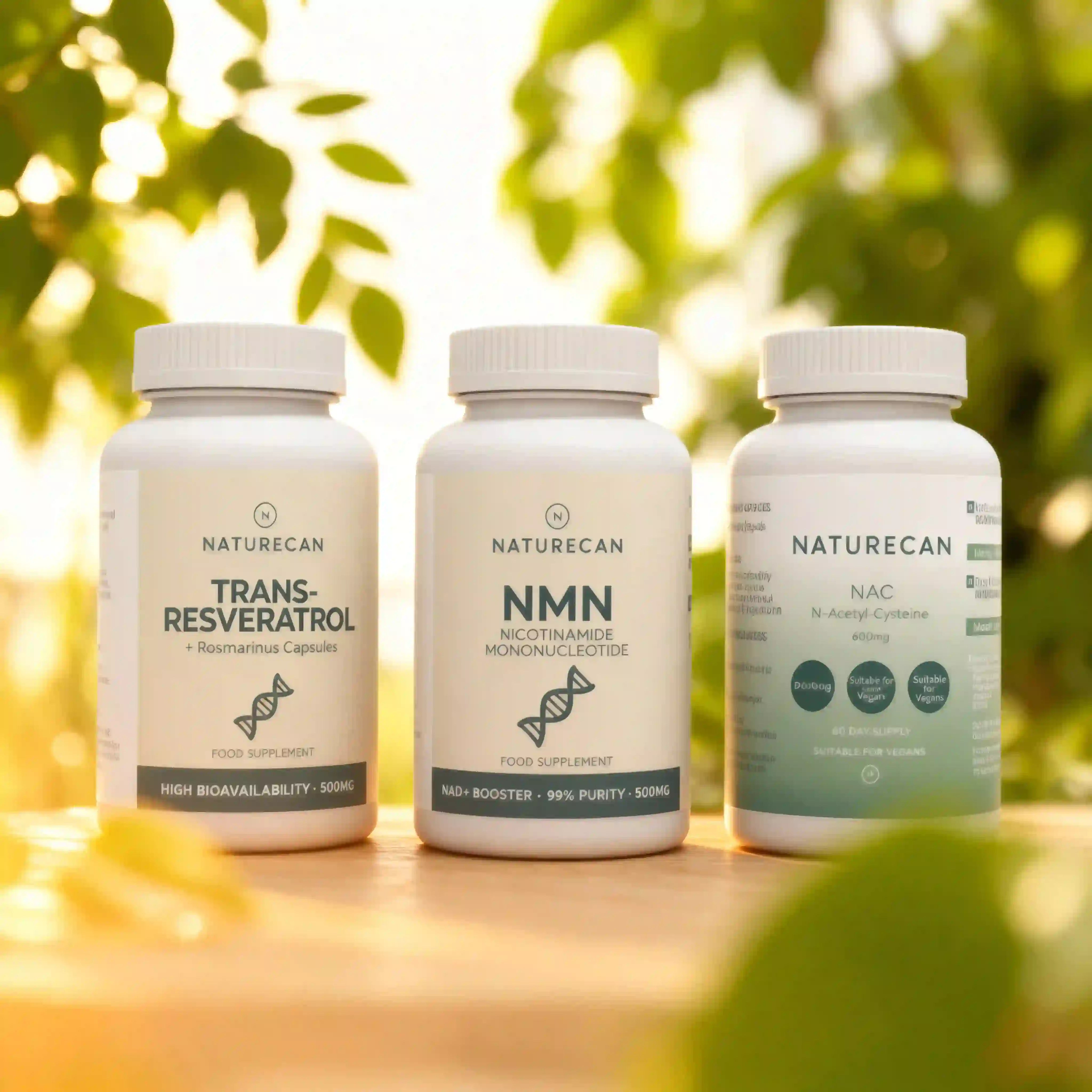How to Slow Down Ageing: 8 Science-Backed Strategies

Written by Beatrice Naujokaite & Reviewed by Paul Holmes.
Getting older happens to everyone, but what if we could slow it down—even just a little? We can't go back in time, but new research shows it might be possible to slow down some parts of ageing, especially when it comes to our health.
Ageing isn’t just about getting wrinkles; it’s a complicated process that includes things like changes in hormones and damage to our cells.How to slow down ageing is a question many people ask, and the answers might be simpler than you think. In this article, we’ll look at the science behind ageing and share eight simple, proven tips to help you stay healthy as you age.
Whether you're into eating well, staying active, getting good sleep, or taking supplements, you'll find easy ways to improve your health and live longer.
The Science Behind Ageing
Menopause occurs when a woman’s body stops producing as much oestrogen and progesterone, signalling the end of her menstrual cycles. While the average age of menopause in the UK is around 51, perimenopause (the transitional stage) can begin as early as your 40s, or even late 30s for some.
Ageing is a complex and multifaceted process influenced by a wide range of biological pathways, many of which are shaped by both our genetic makeup and environmental factors.
It's important to recognise that
As such, many of the mechanisms associated with ageing can actually trigger further damage within the body. Ultimately, there are several key ways in which the body undergoes ageing:
Cellular Damage Caused by Free Radicals and Sun Exposure
Free radicals, which are produced through sun exposure and contact with various toxins, damage skin cells and accelerate the ageing process. This leads to the breakdown of crucial proteins such as collagen and elastin, which are essential for maintaining skin firmness and elasticity.
Oxidative Stress
Oxidative stress occurs when free radicals overwhelm the body’s natural defence systems, leading to the deterioration of cellular tissue. This contributes significantly to the ageing of the skin, organs, and internal systems.
Telomere Shortening
Telomeres are protective 'caps' at the ends of chromosomes. As we age, these telomeres shorten, which limits a cell’s ability to divide and eventually leads to cellular death—manifesting in the visible and functional signs of ageing.
Inflammation
Chronic inflammation—brought on by external stressors, poor dietary habits, or a sedentary lifestyle—is a major contributor to the ageing process, particularly affecting cognitive health and skin condition.
Mitochondrial Dysfunction
Mitochondria, often described as the cell’s powerhouses, become less efficient over time. This decline reduces the body’s ability to produce energy and repair tissues, leading to the degeneration of organs and other bodily systems.
Autophagy
Autophagy is the body’s natural mechanism for cleaning out damaged cells and replacing them with healthier ones through cellular turnover. As we age, this process slows down, allowing damaged cells to accumulate, which further accelerates age-related decline.
8 Science-Backed Strategies to Slow Down Ageing
1. Follow an Anti-Ageing Diet
What you eat plays a crucial role in your overall health and in slowing down the ageing process. A diet rich in antioxidants, healthy fats, and essential vitamins helps protect cells from oxidative stress and supports the body’s natural regenerative abilities [3].
Eat the Rainbow:
Incorporate a wide range of colourful foods into your diet, such as berries, leafy greens, omega-3-rich foods like oily fish, and vibrant vegetables. These foods are loaded with antioxidants, which help protect the body from oxidative stress—a key contributor to ageing[3].
Avoid Ultra-Processed Foods:
Highly processed foods high in sugars and unhealthy fats can disrupt hormonal balance and accelerate the ageing process. Reducing your intake of sugary products and limiting genetically modified (GMO) foods can support healthier ageing.
The Role of Antioxidants:
Antioxidants—including adaptogens, anthocyanins, and vitamins A, C, D, and E—neutralise reactive oxygen species (ROS), which are harmful molecules that damage cells and promote ageing. The authors of Plant Fortification of the Diet for Anti-Ageing Effects explain how antioxidants help reduce oxidative stress, encouraging healthier skin and overall longevity[3].
Plant-Based Anti-Ageing Supplements:
Several plant-based supplements have been found to help reduce inflammation and support collagen production. These include Bacopa monnieri (Brahmi), which is available in our Botanical Blend formula, Curcuma longa (turmeric), featured in our high-strength Active Curcumin supplement, and Emblica officinalis (Amla).
Nutraceuticals:
Natural compounds such as resveratrol and flavonoids have demonstrated potential benefits in reducing inflammation and oxidative stress while supporting skin health and longevity.


12 Causes Of Ageing
Explore the 12 causes of ageing, and how supplements and simple lifestyle changes can help influence that rate and severity of ageing.
Read More2. Exercise Regularly for Longevity
Engaging in regular physical activity is one of the most effective lifestyle choices for supporting healthy ageing. Research suggests that consistent exercise can reduce the risk of mortality by up to **22%**¹². It enhances circulation, supports mitochondrial function, and stimulates autophagy — the body’s natural process of cleaning out damaged cells and regenerating healthier ones¹².
Cognitive Benefits:
Remaining physically active, particularly in later life, has been shown to benefit brain function and may reduce the risk of Alzheimer’s disease and other forms of dementia. These effects may be partly due to improved vascular health and blood flow to the brain.
Muscle and Heart Health:
As we grow older, we naturally lose muscle mass and strength — a condition that can lead to anabolic resistance, mitochondrial dysfunction, and chronic inflammation. These factors are also associated with vascular ageing and may contribute to the weakening of blood vessels⁵.
Skin and Overall Wellbeing:
Exercise contributes to healthier, more hydrated skin by promoting circulation and stimulating collagen production. It also plays a role in reducing fine lines and signs of ageing. Beyond the skin, regular movement sharpens mental clarity and may go someway to potentially help prevent age-related conditions like dementia.
What the Research Says:
According to a large-scale study published in JAMA Network Open, individuals with higher levels of cardiorespiratory fitness (CRF) — which measures how well the heart and lungs deliver oxygen during activity — were found to have significantly lower long-term mortality rates, regardless of age[8].
Recommended Types of Exercise:
To get the most out of your routine, aim for a mix of activities:
- Strength training to preserve muscle mass and bone density
- Cardiovascular exercise such as brisk walking, swimming, or cycling to support heart health
- Yoga or stretching to maintain flexibility, balance, and mental focus

The Longevity Guide: Everything You Need to Know About Longevity


This is our complete beginner's guide to Longevity. We explain what it is, what studies are available, where it comes from, what it is used for, and a few other facts you may not know.
3. Prioritise Sleep for Cellular Repair
Sleep is essential for maintaining both physical health and emotional well-being. In the midst of modern life’s constant demands, it provides the body with a critical opportunity to reset and restore.
During sleep, the body eliminates toxins, clears damaged cellular debris, and repairs tissues. It also replenishes energy stores and facilitates the release of key hormones and proteins.
The brain also benefits from this nightly recovery. While we sleep, it undergoes a form of “spring cleaning”, forming and reorganising neural connections — one reason why we’re often told to “sleep on it” when facing difficult decisions or emotional stress⁷.
Why Sleep Matters
Cellular Repair and Rejuvenation:
Deep sleep is the body’s prime time for healing. It supports the repair of damaged cells, collagen production, and skin hydration. It also boosts autophagy — the natural process of clearing out aged or damaged cells — which plays a crucial role in slowing both visible and internal signs of ageing⁸.
Sleep Disruption and Ageing:
Chronic sleep deprivation or poor-quality rest has been linked to a higher risk of cardiovascular and metabolic diseases. Lack of sleep can accelerate collagen breakdown, leading to reduced skin elasticity, more fine lines, and a dull complexion. Over time, inadequate rest speeds up the ageing process on a cellular level⁹.
Health Benefits of Good Sleep
Weight Regulation: Sleep helps regulate the hormones leptin and ghrelin, which control hunger and satiety. When sleep is disrupted, these signals are thrown off balance, increasing the likelihood of weight gain and, subsequently, the risk of type 2 diabetes¹⁰.
Improved Insulin Sensitivity:
Ongoing sleep loss can impair the body's ability to regulate blood sugar. Studies have shown that cutting sleep from 8 to just 4 hours can significantly affect glucose metabolism, increasing the risk of insulin resistance⁷.
Immune Function:
Quality sleep is vital for a strong immune system. Sleep deprivation weakens immune defences and accelerates ageing. The body even produces “sleep-inducing” immune factors to help support recovery during illness⁸.
Heart Health:
Even a single night of poor sleep can elevate blood pressure. Prolonged sleep issues have been associated with a greater risk of hypertension and cardiovascular disease over time⁹.
Tips for Better Sleep
- Stick to a Regular Sleep Schedule: Aim to go to bed and wake up at the same time each day to support your circadian rhythm.
- Reduce Screen Exposure: Limit screen use at least one hour before bed. Blue light interferes with melatonin production — the hormone that helps regulate sleep.
- Unwind Before Bed: Gentle activities such as stretching, meditation, or deep breathing can help signal to your body that it's time to rest.
4. Manage Stress and Mental Well-Being
Chronic stress doesn’t just affect how you feel — it has a direct impact on how you age. Prolonged elevation of cortisol, the body’s primary stress hormone, can accelerate the breakdown of collagen, contributing to fine lines, sagging skin, and other visible signs of ageing. But the effects of stress go far beyond skin deep. Effectively managing stress can significantly enhance your long-term health, resilience, and overall longevity.
The Power of Social Connection
Research increasingly highlights the role of strong social ties in promoting healthy ageing. A compelling example comes from Okinawa, Japan, one of the world's recognised "Blue Zones" — regions known for exceptional longevity.
Here, people often belong to close-knit groups known as Moais, small social circles that engage in shared routines, communal support, and emotional connection[7]. This regular social engagement is believed to reduce feelings of isolation, improve mood, and even contribute to longer life expectancy.
Mental Well-Being Practices
Incorporating mindfulness and relaxation techniques into your daily routine can be a powerful antidote to chronic stress. Simple practices such as meditation, gentle yoga, deep breathing, or even unplugging from screens for a short while can help reduce cortisol levels and support a calmer nervous system.
Not only do these practices benefit emotional resilience, but they also play a role in maintaining skin health, reducing inflammation, and protecting against stress-related ageing. Regular moments of mental stillness, paired with strong social connections, provide a foundation for healthier, more graceful ageing — inside and out.

5. Support Your Body with Key Supplements
A healthy lifestyle is the cornerstone of graceful ageing — but in today’s fast-paced world, targeted supplementation can offer meaningful support, especially in protecting skin health and slowing cellular decline. Backed by science, certain nutrients have shown potential to address age-related changes and enhance longevity.
Top Anti-Ageing Supplements
Several well-researched compounds have become key players in the longevity space. These include NMN, resveratrol, vitamin C, CoQ10, and hyaluronic acid. Known for their potential antioxidant and regenerative effects, they help maintain skin elasticity, fight oxidative stress, and support energy metabolism[13]. You can find a detailed breakdown in our guide: 10 Best Longevity and Anti-Ageing Supplements.
NMN (Nicotinamide Mononucleotide)
NMN plays a pivotal role in boosting NAD+, a molecule crucial for cellular repair and mitochondrial function. As NAD+ levels naturally decline with age, supplementing with NMN may help restore energy production, support DNA repair, and promote healthier ageing.
Berberine
Berberine is a plant-derived compound shown to support blood sugar balance, cardiovascular health, and gut microbiome function. Its potential anti-inflammatory and metabolic effects make it a valuable addition to an anti-ageing regimen.
Quercetin
A natural flavonoid, quercetin is known for its potential antioxidant and anti-inflammatory properties. It helps protect cells from oxidative damage — one of the key drivers of premature ageing — and may offer immune system support.
Collagen Supplements
Collagen has received growing attention for its ability to restore skin firmness and elasticity. Clinical studies show that consistent supplementation can visibly reduce fine lines and wrinkles over time, supporting a more youthful complexion[13].

Try This: Anti-Ageing Longevity Bundle
For a comprehensive approach, the Anti-Ageing Longevity Bundle combines NMN, resveratrol with rosmarinic acid, and NAC (N-acetyl cysteine) — a powerful trio formulated to support mitochondrial function, cellular detoxification, and skin regeneration in one convenient stack.
6. Optimise Hormonal Balance
As we get older, our hormone levels naturally change. This can affect things like energy, mood, sleep, and even how our body handles weight and muscle. While hormone replacement therapy (HRT) is available, it isn’t suitable for everyone and may carry risks.
Often, simple changes to your diet, exercise, and daily routine can go a long way in helping your body stay balanced[12].
Common Hormonal Changes With Age
- Testosterone: This hormone drops in both men and women with age. Low levels can lead to reduced muscle strength, bone health, and energy.
- Growth Hormone (GH) & IGF-1: These help repair and rebuild tissue, especially while you sleep. When levels drop, it can lead to slower recovery and lower vitality.
- DHEA: This hormone supports the production of others like testosterone and oestrogen. When it declines, your body may feel more stressed and less resilient.
- Insulin Sensitivity: As we age, our body becomes less efficient at using insulin. This can increase the risk of type 2 diabetes and heart-related problems. The good news is that exercise and healthy eating can improve this quite effectively.
Important: 💡 If you're concerned about your hormones or thinking about supplements or therapy, it’s best to speak with your GP or a healthcare professional.
7. Practice Intermittent Fasting and Caloric Restriction
Fasting isn’t just a trend — it's backed by science as a tool for supporting long-term health and healthy ageing. Whether it's intermittent fasting (e.g. time-restricted eating) or periodic fasting (longer breaks from food), these approaches have been shown to positively impact cellular repair, metabolism, and longevity.
Why It Works
When the body enters a fasting state, it activates a process known as autophagy — a natural "housekeeping" function where the body clears out damaged cells and regenerates healthier ones.
This process not only supports skin renewal, but also plays a key role in reducing visible signs of ageing, such as dullness and fine lines.

8. Protect Your Skin from Premature Ageing
Your skin is one of the first areas to show signs of ageing — but with the right approach, you can slow this process and protect it from future damage.
Strengthening the skin barrier, boosting collagen and elastin production, and defending against environmental stressors can all help maintain a smoother, firmer, and more radiant complexion.
Apply Sunscreen Daily
UV exposure is a major driver of premature ageing. It contributes to wrinkles, dark spots, loss of elasticity, and even skin cancer. Applying a broad-spectrum SPF every day — and reapplying every 2–3 hours — helps protect your skin from cumulative sun damage. Don’t forget commonly overlooked areas like the neck, chest, and hands.
Support Collagen with Peptides
Collagen levels naturally decline as we age, leading to thinner, less elastic skin. Naturecan’s Collagen Peptides are a highly bioavailable source of protein that supports natural collagen formation. When paired with vitamin C, these peptides can help improve skin hydration, firmness, and texture — all while supporting broader anti-ageing processes.
Build a Targeted Skincare Routine
Topical care is just as important. Naturecan’s skincare range — including cleansers, serums, moisturisers, and eye creams — is designed to support skin health from the outside in. Formulated with proven ingredients like retinol, hyaluronic acid, and niacinamide, these products help maintain hydration, improve tone and texture, and combat visible signs of ageing.


Anti-Ageing Skin Care Routine: How To Slow Ageing
Discover the perfect anti-ageing skincare rotuine, and how to keep your skin looking younger for longer.
Read MoreThe Future of Ageing Research
At present, it seems the world has reached a kind of temporary 'cap' on life expectancy. Since the first longevity revolution in the 20th century-when public healthcare, vaccinations, and sanitation became widespread-progress has slowed.
This is largely because we've figured out how to maximise the natural human lifespan. Now, the challenge is no longer about surviving childhood illnesses or infections, but about pushing past our biological limits.That is what the second lifespan evolution is about- fundamentally changing how we age.
Currently, there is an ongoing genetics study at the University of Cambridge, for example, exploring long-lived species like whales to understand what secrets their DNA might hold. Meanwhile, the field of Geroscience, which looks at reversing the molecular and cellular drivers of ageing, is gaining serious momentum.
Much of this work is focused on helping us live longer and healthier. (Merritt, 2024). All in all, the second resolution of lifespan is upcoming. There is no saying which approach to reversing ageing will be successful, or the combinations of it, but it is exciting seeing so much work being done in the field.
Conclusion
Ageing is a natural process, however, the choices we make in our daily lives can significantly improve our longevity and overall health. Here are some of the key changes you can make:
- Eat a Healthy Diet: Focus on protein, fibre, and antioxidants. Eat the rainbow and limit the sugar. Caloric restriction and fasting have very limited side effects, but deliver a great increase in longevity.
- Maintain your Skin: Protect your skin with SPF every 3 hours on your face, neck, and body. Use a clinically tested cleanser and moisturiser. For specific concerns, consult your dermatologist.
- Prioritise Sleep: Maintain a regular sleep schedule and limit artificial light before bed. Letting your body rejuvenate will keep you feeling more rested and active, able to maintain good metabolic and health.
- Stay active: Regular physical activity is key to longevity- it will help maintain a good hormonal balance, keep your heart and lungs in top shape. Any type of activity is better than staying at home!
- Manage Stress: Incorporate relaxation practices like yoga and meditation into your routine. Learn how to be nicer to yourself and manage expectations to reduce stress and aim to stay active during stressful periods.
- Limit Smoking and Alcohol: While other measures aim to improve overall health, these two have a direct impact on mortality. Quitting alcohol and smoking can be the best thing you can do for your longevity.
Taking care of your body is not just about looking younger; it’s about feeling better, living healthier, and embracing a fulfilling life.

Anti-Ageing Skincare Routine
Discover the perfect anti-ageing skincare routine, and how to keep your skin looking younger for longer - Read now!
Read Article
How Inflammation Accelerates Ageing and How to Reduce It
Delve into the causes of inflammation in the body, and how inflammation causes ageing. Discover ways to reduce inflammation and prevent accelerated ageing.
Read Article
12 Causes Of Ageing
Explore the 12 causes of ageing, and how anti-ageing supplements and simple lifestyle changes can help influence the rate and severity of the ageing process. Read now!
Read Article







